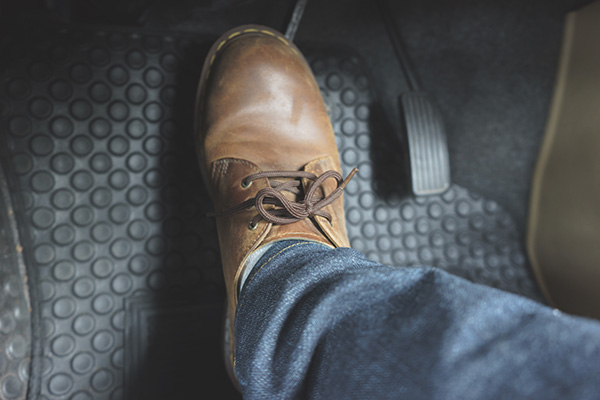
When your brake pedal feels unusually soft or sinks closer to the floor than normal, it’s not just a minor inconvenience. It’s often a sign that something in your braking system isn’t working the way it should. Unlike a squeaky door hinge or a flickering lightbulb, brake pedal issues are tied directly to your safety. The problem may seem subtle at first, but if left alone, it can quickly become serious.
Your brakes are your car’s most important safety feature, and the pedal is your first connection to them. When that feeling changes, something behind the scenes usually needs attention.
Loss of Pressure Points to Fluid Problems
One of the most common reasons for a soft brake pedal is a problem with the brake fluid. This hydraulic fluid transfers the force from your foot on the pedal to the brake calipers at each wheel. If air enters the system or fluid starts to leak, pressure drops, and the pedal feels spongy or weak.
In some cases, the issue is as simple as low fluid in the reservoir. But fluid doesn’t usually disappear without a reason. There may be a leak in the brake lines, master cylinder, or calipers that needs to be identified and repaired right away.
Brake Lines and Hoses Can Deteriorate Over Time
Brake lines carry pressurized fluid through your car, and those lines are under constant stress, especially during stop-and-go driving. Over time, they can corrode or develop cracks. Flexible rubber hoses can also swell internally, making it harder for fluid to flow.
If you’ve noticed a drop in braking performance or the pedal feels inconsistent, a technician may find damage in one of these components. Catching these issues early helps avoid total brake failure and costly repairs.
Master Cylinder Trouble Is a Serious Warning Sign
The master cylinder is the heart of your braking system. It distributes fluid to each wheel and maintains the pressure needed for effective braking. When the internal seals begin to fail, fluid can bypass the pressure chambers instead of flowing where it should.
This can cause the pedal to slowly sink when held down or feel like it offers no resistance at all. A failing master cylinder should never be ignored and requires immediate service.
Worn Brake Pads Can Also Change Pedal Feel
While worn pads usually create noise before affecting pedal pressure, extremely thin brake pads can cause the caliper pistons to extend too far. This can make the pedal feel soft or delay braking response.
In most cases, pad wear shows up as a grinding or squealing sound, but if you haven’t had a brake inspection in a while, your technician will check pad thickness during diagnosis. Replacing pads before they’re too thin helps prevent rotor damage and ensures firm, responsive braking.
Air in the Brake Lines Makes the Pedal Feel Spongy
If air bubbles enter the brake system, the pedal often feels soft or bouncy. Since air compresses under pressure, it interferes with the smooth transfer of force from the pedal to the brakes.
This can happen after a recent repair if the system wasn’t bled properly, or from a leak that allowed air inside. Bleeding the brakes removes trapped air and restores the firm pedal feel drivers expect.
Don’t Wait for the Problem to Get Worse
Brake pedal changes often happen gradually. You may notice the pedal needs more pressure, feels too soft, or travels farther than it used to. These are all warning signs that shouldn’t be ignored. If the issue continues without being addressed, you may suddenly find yourself without enough braking force in an emergency.
If your car feels different when stopping, it’s better to get it checked now rather than assume it's a minor issue. Brake problems rarely fix themselves, and waiting often leads to longer repair times or higher costs.
Have Your Brakes Inspected at Taylormade Automotive in San Francisco, CA
At Taylormade Automotive in San Francisco, CA, our technicians can quickly diagnose the reason behind a soft brake pedal and perform the repairs needed to restore safe braking. Whether it’s air in the lines, a failing master cylinder, or worn pads, we’ll make sure your car stops the way it should.
Don’t take chances with your safety—schedule a brake inspection today and keep your vehicle ready for whatever the road brings.